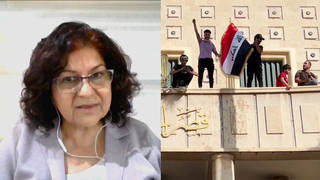
In the largest labor strike since the invasion of Iraq, ports along the West Coast — all twenty-nine of them — were shut down as some 25,000 dockworkers went on a one-day strike to protest the war. We speak to Jack Heyman of the International Longshore and Warehouse Union. [includes rush transcript]
Transcript
AMY GOODMAN: We’re going to turn very quickly now to the protests that took place here on Thursday to mark May Day. There were — in the largest labor strike since the invasion of Iraq, ports along the West Coast, all twenty-nine of them, were shut down as some 25,000 dockworkers went on a one-day strike to protest the war. Several other smaller antiwar actions took place in other parts of the country. Meanwhile, tens of thousands of marchers in defense of immigrant labor rights in several cities, including Los Angeles, Chicago, Milwaukee, New York, Washington, D.C., San Francisco, Houston, Seattle and here in San Diego, took to the streets.
We’re going to turn now to the dockworkers’ strike, where the workers from the International Longshore and Warehouse Union brought the port operations to a halt from Long Beach to Seattle in defiance of their employers and arbitrators.
We’re joined on the phone from San Francisco by Jack Heyman, an officer with the International. Welcome to Democracy Now!, Jack Heyman. Can you talk about the significance of what happened yesterday?
JACK HEYMAN: Well, yeah. We were really proud here on the West Coast, as far as the longshore union, the ILWU, making this stand, because it’s part of our legacy, really, of standing up on principled issues. And this, I think, is the first strike ever — well, I would call it a stop work, work stoppage, whatever you want — workers withholding their labor in demand — and demanding an end to the war and immediate withdrawal of the troops.
AMY GOODMAN: What about the significance of the arbitrator saying that the longshoremen should not go out on strike?
JACK HEYMAN: Well, you know, the interesting thing about this action is that not only did we defy the arbitrator, but in a certain sense we defied our own union officials. The union officials did not want to have the actions that we organized up and down the coast. And the arbitrator’s decision is simply — we don’t take our orders from the arbitrators. We don’t take it from judges. The rank and file goes out and does what it has to do.
We did that in 1984, when the ship came in from South Africa, the Nedlloyd Kimberley. We refused to work that ship for, I think it was ten or eleven days. And that was in defiance of what an arbitrator said and also against what our union officials were telling us.
So we’ve got a strong tradition in the ILWU of rank-and-file democracy, workers’ democracy, where we implement what we decide in a democratic fashion. And our action took place based on a motion that came out of our caucus, which is like a convention of all longshoremen represented up and down the coast. And we decided to stop work to stop this war, and that’s what was carried out.
AMY GOODMAN: The action within Iraq in solidarity with your strike, can you talk about that?
JACK HEYMAN: Well, I think that really was the icing on the cake, because we were appealing for solidarity actions. And I know there was some actions in New York with the college teachers at a New York community college and teach-ins with students and so forth; there were postal workers that had a few moments of silence, a few minutes of silence in New York, Greensboro, North Carolina, and out here in the Bay Area; but really, the most stunning solidarity came from the port workers in Iraq, who struck in solidarity with us. And that was really a very courageous move, because they’re literally under the gun of a military occupation there.
AMY GOODMAN: What are your plans now?
JACK HEYMAN: Well, what this action was was raising the level of struggle from protest to resistance, and we’re hoping that these kinds of actions will resonate to other unions and workers.
It’s already catching on with some of the port truckers. Actually, they’ve been doing actions for quite awhile. While it’s not mainly based on the war — I think they’re very much affected by the high price of fuel — they’ve been shutting down ports over that issue, but also immigrant rights, because many of them are immigrant workers.
And I hope that this will be an example to other workers that we have the power, we’ve got to use it. And that’s how we can bring this war to a halt.
AMY GOODMAN: Well, I want to thank you very much, Jack Heyman, for joining us from San Francisco, an officer of the International Longshore and Warehouse Union.












Media Options